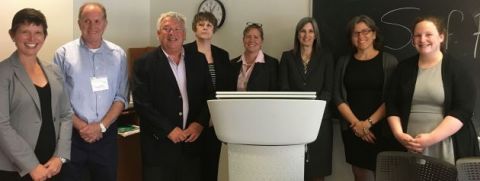
Queen’s joined other law schools across the province on October 3 to raise awareness about the experiences and challenges faced by self-represented litigants (SRLs) when accessing Ontario’s court system. The event, SRL Awareness Day, is an initiative of the National Self-Represented Litigants Project (NSRLP).
As a part of the event, a panel of local alumni spoke about the width and breadth of the SRL issue in family and criminal court and beyond. “Being unrepresented is a significant access to justice challenge,” says Karla McGrath, LLM’13, the panel’s moderator and Executive Director of the Queen’s Law Clinics. “We examined some of the solutions being considered and others that are being engaged.” This included the use of supervised students, paralegals and limited-scope retainers.
Having speakers with diverse backgrounds helped to bring unique perspectives to the discussion, said panelist Professor Nick Bala, Law’77. Indeed, the panel was able to provide views of lawyers, as well as judges working in both the criminal and family law fields, and there was also discussion about challenges in the civil justice process.
Justice Geoffrey Griffin, Law’82, of the Ontario Court of Justice described how judges find themselves in a difficult position when dealing with SRLs within the adversarial criminal justice system. “It requires an awkward balancing act of ensuring a fair trial while not appearing to compromise impartiality by the suggestion that the judge has become ‘counsel’ for the SRL.” This tension and the related challenges for the criminal justice system is the result of high-cost legal services and limitations on Legal Aid, Griffin explained. He concluded that “we as a society must do something about the high cost of legal services if justice for everyone is to be achieved.”
The heightened concern for trial fairness in cases involving SRLs also places more responsibility on Crown prosecutors in the criminal context, Jennifer Ferguson, Law’94, Assistant Crown Attorney, noted. The role usually played by opposing counsel in ensuring their client has received adequate disclosure must to some extent be performed by the Crown attorney. “There are further challenges when SRLs are incarcerated,” Ferguson said. “The Crown must ensure the accused is provided with an opportunity to receive and review ongoing disclosure, while at the same time safeguarding the information from dissemination.” At trial, Crown counsel plays an active role, alongside the judge, to ensure fairness in the process and to take the steps necessary to protect the interests of victims and witnesses, as well as the interests of the accused.
The use of technical language and terminology in the justice process was an issue raised by Patricia Knox-Leet, Law’94, a criminal lawyer with Legal Aid Ontario, who identified it as “one of the biggest issues faced by SRLs.” Court processes are difficult to follow with lawyers, judges and court staff speaking very quickly and in legal terms alien to most lay persons. “After many years as the duty counsel, I see the inability to communicate with or to understand these players as the most frustrating piece for SRLs,” Knox-Leet said.
Similarly, Leanne Wight, Law’04, Supervisor-Duty Counsel with Ontario Superior Court of Justice – Family Court Branch, discussed the challenges posed by procedural requirements in family court. Wight explained that “litigation in the family court is paper intensive and process driven.” Especially for SRLs in the family law context, who are also dealing with the breakdown of a relationship, things like document preparation are particularly challenging, she said. “We need to advocate for reforms that will make family court more accessible and provide greater support to SRLs.”
Access to family justice is also an area that captured the interests of Professor Bala, the lead researcher of a Social Sciences and Research Council-funded project focused specifically on this issue. “One of our projects is to encourage lawyers to use limited-scope retainers as a way to provide less expensive legal services,” he said. He also recounted a project in which student volunteers administered a questionnaire to collected data about the experiences of the increasing number of SRLs in the family court system. The study not only produced helpful data, but also allowed the student volunteers to gain valuable client interaction experience.
“The panel was a very small part of what Queen’s is doing to increase student awareness and find solutions to issues related to access to justice,” Bala later said. The Queen’s Family Law Clinic is very important in this regard. “I am very pleased with the university’s support of the family law clinic,” said Bala. “The Faculty of Law and Dean Bill Flanagan are very concerned about access to justice. What we will continue to do on this issue remains an evolving story.”
By Michael Adams